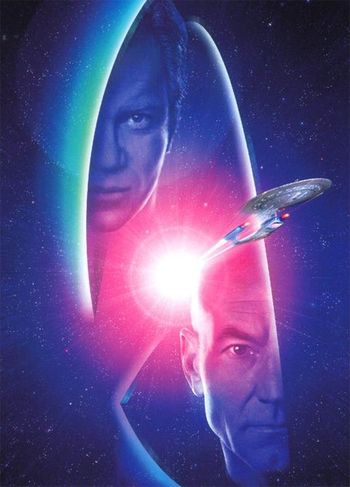 |
| "Two captains. One destiny." (Image stolen from the Memory Alpha) |
"Who am I... to argue with the captain of the Enterprise?" - James Kirk. Well... the former Captain of the Enterprise, missing for 78 years?
Written By: Brannon Braga and Ronald D. Moore
Directed By: David Carson
Plot: In the year 2293, the first voyage of the Enterprise-B goes south when the ship has to perform a rescue mission. An energy wave comes into contact with the ship, taking with it a scientist that was rescued, as well as Captain Emeritus James T. Kirk.
In the year 2371, the Enterprise-D comes into contact with that same scientist - Tolian Soran. He wants to continue his observation, but Picard prevents him from doing so. Going mad, he kidnaps Geordi, trades him to some Klingons, and holes up on a planet where he can shoot a rocket into the sun, bringing the energy wave - the Nexus - over to him. Only one man can stop him... but he himself is emotionally shaken up, having lost his brother and nephew. So... what about two men?
Review:
Three hundred posts, give or take. Hot tamale, that's... three hundred more (give or take) than I thought I would post back in February of 2013. Guess I got into this reviewing thing a bit, eh?Two years ago, in an attempt to combat a lull in my reviews (because of a relative lack of content from Gravity Falls and Red Dwarf), I decided to take up reviews of Star Trek movies. It actually helped - a jog of my brain helped me start reviewing Steven Universe, and I managed to bang out five of the six movies over the second half of the year - only skipping Wrath of Khan because I reviewed it a year prior. My intent was to review the four TNG movies in December, but personal commitments led that astray, and my review of The Undiscovered Country wound up coming out on Christmas.
Now, I'm back reviewing the TNG films - and I'm about to formally move this blog over to Wordpress. And what better way to start (and end) than reviewing the bridge between TOS and TNG - Generations?
Well, it's a bridge weaker than the one in this film.
The idea to actually keep TOS and TNG into one film is a rather curious one, actually. I mean, TNG had finished up as one of the highest rated syndicated programs in TV history, DS9 was developing a cult following - even Voyager was in production. Why, just why, did Paramount think TNG couldn't strike out on its own? It was a surprising lack of confidence in their premiere franchise.
But, hey, that can be ignored if the movie is good, right?
Well...
Here's the deal. They didn't need Kirk. Seriously - delete him from the movie, and there would be relatively few edits to the film. Hell, the crossover idea itself feels like it's slapped on. Leonard Nimoy and DeForest Kelley (who appeared in TNG, mind you) recognized this when they were approached with the script, and responded by not taking up their roles. James Doohan and Walter Koenig would stand in - possibly a send-up to their role in Search for Spock as the men who helped bring the original Enterprise down, but here, their role is of little consequence.
Anyway, after (surprise, surprise) a distress call, the Enterprise B (surprise, surprise, the only ship in range) winds up in contact with the Nexus, taking with it Soran and Kirk. Soran winds up as the antagonist, whereas Kirk winds up back in during the third act. Nice even plotting there, writers! This stuff makes Star Trek look like a bucket of cliches - and that's only acceptable if you need to reintroduce people to the franchise (and even then, only barely.)
So, let's ditch Kirk for now and get to the meat of the plot - Picard vs. Soran.
On one hand, I can appreciate the themes that the movie was trying to convey. After all, if The Wrath of Khan took a look at the effects age has on somebody, then Generations analyzes the effect that not making a choice can have - our regrets, our dedication to our careers. For Picard, he denied himself the chance to create his own family, believing that the family name would carry on.
A chateau fire would alter his plans. With his brother and nephew (from "Family") being killed in a fire, Picard reflects back on the choices he didn't make - those that may have inadvertently ended the Picard family line. I mean, he isn't at fault at all, but it makes him realize the unceasing march of time... and for a while, resent it. Some would argue that this makes little sense, given how uncomfortable he is with children. And, to their credit, that is a fine argument. Still, "The Inner Light" gave him a taste of family - one that, in this episode, he realizes may have passed him by.
Enter the Nexus - and Soran, a man who lost his own family. Unable to move past it, the meeting of the Nexus managed to give him a new life - or at least, produced a manifestation of his deepest desires. However, he can't let go of that one moment of happiness, to the point where he is willing to kill millions just to contact it again. (Don't ask how the Enterprise-B survived the Nexus whereas every other spacecraft that contacted it was destroyed. Just go with "flagship immunity" and move on.)
The issue lies in the fact that Soran gets relatively little screen time. Yes, he's angry over the loss of his family, and takes his revenge out on the concept of time itself. But there's little gravitas to his role. He honestly doesn't stand out in the way Khan, Kruge, or even flipping Sybok stand out. His character is out of focus, blocking him from gaining Khan's level of focus; there's little in the way of Kruge's nuances, thus blocking the viewer from taking interest in his overall goal; and say what you will about Sybok, but his goal to actually meet God was fascinating, even if the movie's execution was substandard. Honestly, of all the Star Trek antagonists I've reviewed so far, Soran is probably the weakest.
But, back to his goal.
The Nexus is supposed to grant those that come in contact their deepest desire - something of a heaven. For Soran, it was his family, and for Picard... the family he never had, surprisingly enough. Or is it? Guinan says that the power of the Nexus is so strong that one wouldn't want to leave. Picard decides to leave to fight Soran - instead of, y'know, having him arrested, because action fighting is what I think of Picard - but he needs some help.
Enter Jim Kirk.
One of the most critically derided movies in the Trek franchise is The Final Frontier. The script is subpar, half of the characters become caricatures, and the special effects are a mess. Still, one of the few aspects of the movie that seems to have held up is Kirk trying to deal with his pain. Referring to Sybok's attempts to convert his followers, Kirk rebuts that he needs his pain. In a movie that featured Uhura fan-dancing and marshmelons, it was one of the more poignant moments, and when I rank the Trek movies, may have saved it from the bottom spot. Maybe.
This movie turns it on his head - the Nexus is so addicting that Kirk no longer has to face his pain. How is this accomplished? Is his son back? Does he get to hang out with his closest friends, or reunite with Dr. Carol Marcus? No - he gets a house in the countryside, is getting ready to propose to a woman we don't meet, and etc. Really - it's like Moore and Braga realized they needed to write the third act around breakfast time on the day it was due. It all feels so weak... even Kirk horseback riding feels rather blase.
Still, Picard manages to get Kirk to come with him and fight the nutjob. Seriously - so strong is Soran's insanity that he was willing to hire mercenaries - by which I mean the Duras sisters - to distract the Enterprise with a good-old fashioned space battle.
And, surprisingly enough, despite being blown to bits themselves (thanks to sheer luck, as per the Star Trek way), the Sisters manage to take down the old lady. The flagship of the Federation - one's able to sustain an energy wave that wiped out most other ships that came in contact with it, another unable to sustain a skirmish with mercenaries. To be fair, the Klingon ship did strike the Enterprise-D at the perfect spot, and the Enterprise-D only took out the sisters thanks to the power of Treknobabble... yet this is a strange way for it to go.
And a rather sad way, as well. The original Enterprise went out because a) it was operating on less than a bare-bones crew, b) it was heavily damaged by Khan, and c) Kirk himself gambled it to get Spock back and to take out "Klingon bastards" who "killed his son". The Enterprise-D... just encounters a nutjob, gets into a skirmish, they hit at the right time, and she dies. Tying this into the movie's theme, it does make sense that it goes out in the most sudden and jarring of ways... but still, compared to what this franchise did ten years prior, it could've been handled better.
Give Troi some level of credit, though - thrown at the controls for just a few minutes, she crash-landed the saucer on a foreign planet, and apparently, casualties turned out to be light. Dr. McCoy once said, "treat her like a lady, and she'll always bring you home." Well, the old lady in her dying moments let most of her crew come home - even the cat.
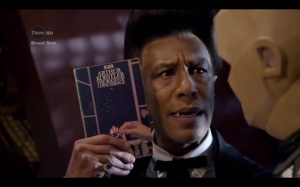 |
| No, not that cat. |
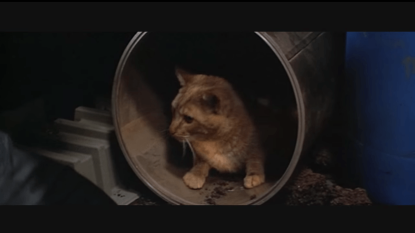 |
| That's better. |
But, we must remember. For he's not really dead, as long as we remember him. And so, we must think about the death... of Lieutenant Cuddles.
He might have been laconic in his speech, not one to move around without somebody else, and maybe a bit too keen to depart from Starfleet uniform. But he had a way with children - more than Picard. He was stuffed full of vigor, yet prepared to give comfort in his time of need. How tragic, then, that he wound up separated in the confusion, and was vaporized before he could be rescued. Of all the souls we have encountered in this franchise... his was the most... cuddly.
And so, we reflect on Lieutenant Cuddles - by all accounts, the highest-ranked Starfleet fatality of the entire crisis.
Oh, except for this one guy, Captain Jim something...
Yup - Kirk dies! Soran proved incompetent at evil lair construction, so just before he gets defeated, an actual bridge falls as Kirk tries to get the remote. Thus, Kirk actually did die on the bridge. Nice joke, writers.
As you could probably guess, a lot of fans really dislike how Kirk's death was handled - calling it unbefitting for a pop-culture icon. And I can see where they're coming from - as a send-off to a pop-culture legend, it is a bit off. Still, for various reasons, I will play devil's advocate regarding Kirk's death. I mean, consider the campfire scene from Star Trek V: The Final Frontier:
"I've always known... I'll die alone."Now, look at him. No Spock. No McCoy. Not even Scotty is with him. His partner in the Nexus was a fiction of his imagination. Yes, Picard is with him, but more as an acquaintance on this last mission rather than a close friend. In many ways, he did die alone. A rather prescient fellow, Kirk was.
That, and I can see where the writers were coming from in killing off the character so suddenly. The overreaching theme in Generations is time and the suddenness of events. By killing off Kirk so brazenly, it really does deliver a gut-punch. They weren't going for the Spock-esque "heroic sacrifice" - they were going for something that was sudden. Much as he helped save those on Veridian IV, it's still a more brazen way to go.
Still, that doesn't mean it's anywhere close to Spock's death. That tied into so many themes - the idea of sacrifice, the no-win scenario, attitudes to life and death, Spock doing something so human for logical reasons, the needs of the many... Star Trek II was rich, and Spock's sacrifice culminated with a sobering funeral and Kirk being forced to face the no-win scenario. Kirk? He and Picard give a brief "thanks" to each other while the former bleeds out under a few tons of steel ("It's the least I could do for the Captain of the Enterprise"), Kirk declares that it was "fun", keels over, and Picard, honoring the most decorated Federation captain ever... chucks him under some rocks, and he's never mentioned again. Bill Cipher got a better funeral.
There's also the overall nagging feeling that, again, Kirk's presence in the movie was unnecessary. Replace him with anybody else, and the movie would need few changes. Because of this, the impact of his death is lessened.
Getting rid of the rest of the impact? Star Trek VI. Honestly, that was such a perfect send-off for our cast and crew. This idea that they would have further adventures off-screen, whether together or alone, is flushed - simply because Paramount had no confidence in a standalone TNG movie... it really sours the mood a bit. Yeah, just because I can like aspects of Kirk's death doesn't mean I can appreciate the fact that it was there in the first place.
And that's the problem with this movie. The writers and executives wanted to pass the torch, yet they didn't need to. They half-assed it in favor of a rather weak plot, threw in the pointless emotion chip, showcased the destruction of the Enterprise... it tries to juggle all but doesn't do it effectively.
Its themes of the march of time and how we handle it aren't bad, and I can appreciate it as a novelty... but man, could this have been handled better.
Tidbits:
- Before anybody asks... yes, there is a B-plot featuring Data implementing his emotion chip - this after a particularly awkward moment in the Holodeck involving Dr. Crusher and water. It does provide one of the most poignant moments in the movie ("Sir, I no longer want these emotions"), and all we have to do is watch Data overreact to stupid jokes and sing about tiny little life forms. I will say that it was shorter than "Row, Row, Row Your Boat", even though that song had a payoff. ("Life is most certainly not a dream.")
- "Don't let them promote you. Don't let them transfer you. Don't let them do anything that takes you off the bridge of that ship. Because while you're there, you can make a difference." Honestly, this might be among my favorite lines in the movie. Remember the last time Kirk was an admiral? He was depressed, lonely, and lost. His decision to retake the helm in Wrath of Khan worked because it helped him become young at heart again. His demotion at the end of The Voyage Home was only a technical demotion - as Starfleet knew he was Captain material. So, even though I think Kirk's place in the movie is redundant, I can appreciate that line.
- I've been a bit rough on the movie, so I will say something positive - with the exception of a few camera scenes during the climactic fight, the special effects in this movie are pretty good. The decision to destroy the Enterprise was an attempt to take the model out of commission (because CGI was the way of the future), and the crash sequence itself is rather cool. I think it dawned on everybody as soon as the ship struck the ground that she wasn't getting up from that one.
- Worth noting - the original film had Kirk shot in the back. It would've been more brazen - suddenness of change and time and all that - but honestly, the bridge is somewhat more befitting.
Wrap Up:
Favorite Scene: Picard breaks down in his quarters over the fact that his brother and nephew died. I just love the interaction between him and Troi, I love the pathos and the temptation that will try and lure him into the Nexus later... it's just a well-executed scene.Least Favorite Scene: I guess Picard's decision to fight Soran head-on instead of, you know, arresting him. God, even the hole that Picard crawled through was smaller than that plot hole.
Score: 4.5. I honestly waffled between a 4 and a 5 on this one. In the end, I decided to split the difference. It has some good bones - it just could've been far better.
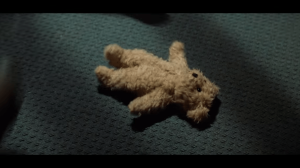
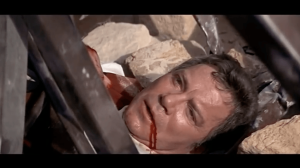
No comments:
Post a Comment